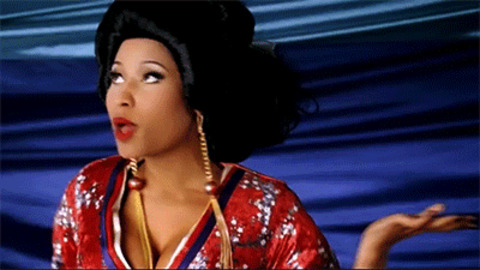In this 21st century, we are now considered as a global village where we all able to go to new places and learn about a myriad of cultures. With that, East meets West and orientalism was formed. But before moving on, you may ask the question, “What is orientalism?”
According to the author of the book “Orientalism” Edward Said (1978), “Orientalism is the Western attitude that views Eastern societies as exotic, primitive and inferior.” In short, it is when the West takes elements from the East and incorporate it into their culture. From what I noticed in my interests, hip hop would also include orientalism elements in their artform.
Nicki Minaj, a well-known female American rapper used some form of orientalism in her music video “Your Love”. In one of her lyrics, “When I was Geisha he was a samurai somehow I understood him when he spoke Thai” shows that in terms of orientalism, she is taking multiple Asian cultures and combining them as a whole. In her music video, she would wear make up that would imitate a Japanese style and wear a sexualized Geisha outfit, which does not resemble the historical meaning behind the traditional Geisha outfit, just a form of some exotic appeal in her video.

Figure 1. Nicki Minaj wearing the Geisha in the music video “Your Love”
Nicki Minaj used a normal form of orientalism, but did you know there are also other forms of orientalism?
Wu Tang Clan, the famous 90s American hip hop group would use elements from the East in their lifestyle and also their songs. Typically, orientalism would be associated with Europeans using the Eastern culture features as an exotic trend, but Wu Tang Clan is an African American based group. Hence, this new form of orientalism would be called “Black Orientalism”. So in a way, Nicki Minaj would also be considered as a form of black orientalism.
Wu Tang Clan would use a lot of Eastern elements in their music and lifestyles, specifically using the ideas and philosophies of Buddhism and Taoism. This Buddhism/Taoism approach originated from the leader of the hip hop group RZA, due to his influence on Buddhism during his spiritual journeys in life. RZA had other influences as well, which included kung-fu films, comic books and Eastern religions, known as the “patchwork of poached taos in life” “RZA used his “poaching” to construct an arsenal of spiritual “strategies” and “tactics” to deal with his life circumstances and help him and the Wu Tang Clan attain success” (Gonzalez-Dysinger D. 2015)
RZA’s philosophy was one of the main reasons for Wu Tang Clan’s image, attitude and style of the group. The group would base their songs and albums on a mixture of African American culture and also the Eastern influence.
Figure 2. One of Wu Tang Clan’s album using the Eastern elements in their album artwork
Another form of orientalism can be found in Japan called “Techno-Orientalism”, which emerged in around the 1980s. Techno-Orientalism refers to a mixture the exotic features of the Eastern culture with futuristic science fiction narratives, which is also falls under the genre Cyberpunk.
The film “Blade Runner” in 1982 was one of Hollywood’s main productions that showcased what techno orientalism was to the globe. The film displayed a dystopian version of Los Angeles, with a Japanese futuristic look such as neon-lit lights, women wearing a Geisha in gigantic billboards and etc. This example shows of how techno orientalism creates a Western and Eastern hybrid with scientific elements in play, creating a cyberpunk vibe in their film.

Figure 3. The introduction scene of the 1982 film “Blade Runner”
One may raise the question though, “Is orientalism considered as a form of racism?” To answer that question, we have to understand what is racism.
“Racism is the belief in the superiority of one race over another, which often results in discrimination and prejudice towards people based on their race or ethnicity” (Garner S. 2017).
Orientalism is more being fascinated of the Eastern culture, rather than mocking or thinking they are the superior culture. In context, being fascinated by the exotic and foreign features of the Buddhism culture just like RZA would be considered as an Orientalist. Making fun of the an Asian culture’s appearance or citizens would just be straight up racism.
References
- Ebert, R. (1982, June 02). Blade Runner Movie Review & Film Summary (1982) | Roger Ebert. Retrieved from https://www.rogerebert.com/reviews/blade-runner-1982-1
- Garner, S. (2017). Racisms: An introduction. London: SAGE.
- Gonzalez-Dysinger, D. (n.d.). Shaolin Monks on the Mic: Orientalism, Buddhism, and the Wu Tang Clan, Pt. 1. Retrieved from https://www.whrb.org/archive/shaolin-monks-mic-orientalism-buddhism-and-wu-tang-clan-part
- Lee, B. (n.d.). Pop/Hip Hop. Retrieved from http://modernorientalism.weebly.com/pophip-hop.html
- Said, E. W. (2006). Orientalism. Brantford, Ont.: W. Ross MacDonald School, Resource Services Library.
- R. (2014, April 17). What is Orientalism, and how is it also racism? Retrieved from http://reappropriate.co/2014/04/what-is-orientalism-and-how-is-it-also-racism/

